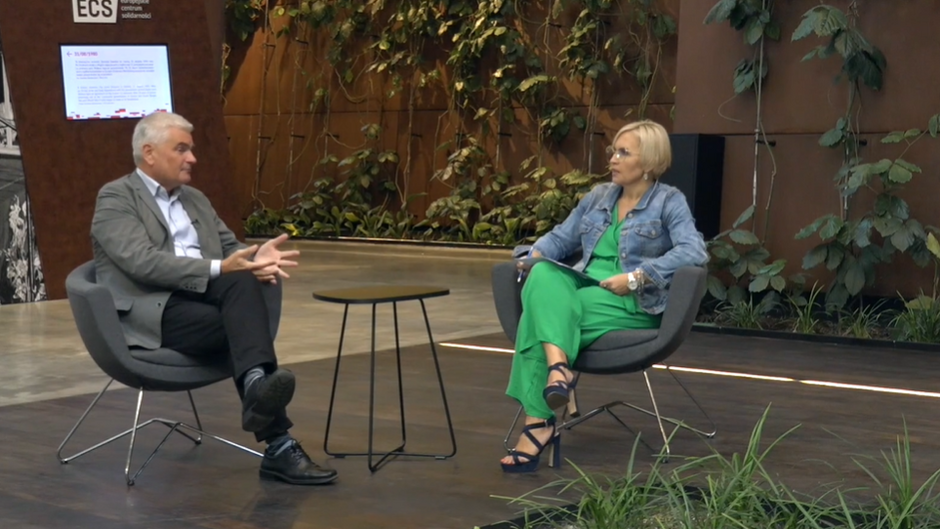Agnieszka Mikhailov interviews Edwin Bendyk in the European Solidarity Center building
Photo www.gdansk.pl
What’s with this democracy?
Agnieszka Mikhailov: – Is the biggest test and celebration of democracy the general election and what will happen next year?
Edwin Bendyk: – Of course. This is the logic of the democratic process. Every now and then the government’s mandate is renewed by leaving the decisions to the rulers – this slogan has gained immense popularity in recent years. And it’s about citizens. This process has evolved. Once upon a time, rulers were a very small group. Even in the early 20th century, even in countries synonymous with today’s democratic order, such as Sweden, only a few percent of adult men had the right to vote. It was after the First World War that it began to develop. Democracy has become commonplace. Even the current authoritarian regime relies on democratic mechanisms, namely elections as a mechanism of legitimacy. Although we know that in, for example, Russia, this process is regulated. But it has become so important that even Vladimir Putin has had to resort to democratic procedures to validate his power. Although he probably didn’t have to – with all the resources he gathered. This shows the importance of the moment itself, but also its danger. It is a ritual without substance – it has political meaning, but in reality, Russian democracy has nothing to do with democracy – if we understand democracy more than the procedures of power and choice as an everyday practice.
Gdask Democracy Week. Debate on human rights and humanitarian crisis
Who will win the parliamentary elections in Poland in 2023?
Edwin Bendyk: – This is a very good question. Maybe not all have the same expectations. Supporters of the current camp may hope that the United Rights will regain power and will be able to extend power for another term, inspired by what happened in Hungary, where Orban renewed his power for a fourth time.
VIEW ENTIRE INTERVIEW OF AGNIESZKA MICHAJŁOW WITH EDWIN BENDYEK
Crisis. Their influence on power
Agnieszka Mikhailov: – Is it possible?
Edwin Bendyk: – It’s possible, of course. We live in such an age that any kind of forecasting is not only in terms of bars of support for political formations, but the context in which it influences politics. War – who a year ago assumed that there would be such a turning point? There is a pandemic in 2020 – who is ready for this type of crisis? We already know today that we are moving from crisis to crisis, and this has an impact on politics. On the one hand, this destabilizes the power system, but at the same time governments, especially the one we have in Poland, namely the populist government, which does not hesitate to use the instruments of propaganda and disinformation, can also use the crisis to build, or at least consolidate, its electorate. . An important moment begins in Poland, unlike in Hungary, which I mentioned, because the current system of power does not have a majority behind it. We know that. He will never have the majority of society. Poland is a more pluralistic society, but the mobilization of this minority has so far been enough to restore power. This is because the opposition has disbanded. The opposition was unable to form a compact bloc. Other societies, let’s call it pluralists, are victims of this pluralism, which makes it difficult to build a common agenda between conservative PSL and the Left – because of the different sets of values that exist on these banners the Parties.
GTD. Volunteer Face. The debate on social engagement in a post-pandemic world
Should the opposition try harder today, or should it be the ruling party? Maybe the election will be affected by a crisis or a recession?
Edwin Bendyk: – The crisis will be a significant factor. Everyone knows they have to try. It can be seen how even Jarosław Kaczyński understands it. You can also see how difficult it is to translate this need into effective action. Regarding Law and Justice, the most unexpected factor is the president himself, because it is not known what he will say.

“Reader. Future teen idol. Falls down a lot. Amateur communicator. Incurable student.”


![Bogusław Wołoszański: “Achieving nuclear weapons would be the beginning of World War III” [WYWIAD]](https://storage.googleapis.com/bieszczady/rzeszow24/articles/image/877236c0-66fd-457a-9eb4-41792f9077ff)




